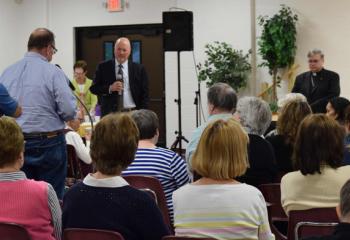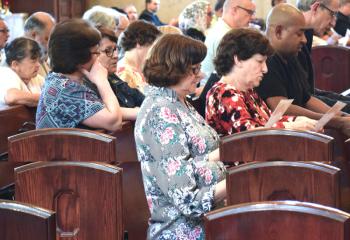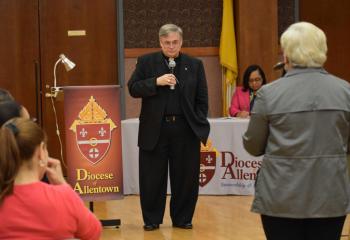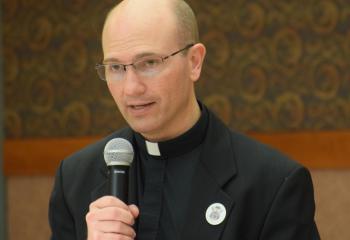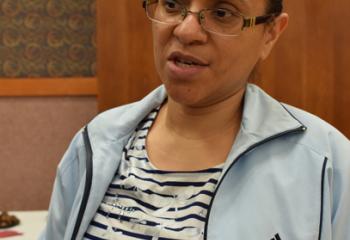By PAUL WIRTH Diocesan Communications Staff
The small group meetings at the heart of “Healing Our Church” led to many discussions across the Diocese about clergy sexual abuse. They also raised many questions in the minds of parishioners.
Bishop Alfred Schlert answered those questions by inviting participants to a series of six meetings in May and June, including one session conducted in Spanish.
“The Bishop was very transparent,” said one attendee at the wrap-up meetings, Pamela Patino of St. Paul Parish, Allentown. “He gave us a real sense of confidence in what he was saying. I could tell by looking at his eyes, and at his expressions.”
“I would like to commend Bishop Schlert for speaking with us with genuine humility, accountability and responsibility for what has happened,” said attendee Paul Bassler of St. Catharine of Siena Parish, Reading. “I truly believe Bishop Schlert has done much to begin to heal our Church.”
George Beam, a member of Holy Trinity Parish, Whitehall, said, “I appreciate the very frank and open discussion the Bishop has offered. It is a good start toward healing.”
Hundreds of written questions for the Bishop were gathered by group coordinators at the 65 parishes where “Healing Our Church” sessions were conducted.
Among the topics of the questions: holding Bishops accountable, where the money comes from, and Bishop Schlert’s role in dealing with abuse, both as Bishop and as Vicar General.
Bishop Schlert began the meetings by apologizing to victims and their families, to those in attendance, and to all Catholics “for the despicable deeds done by some members of the clergy, and for the hurt, the pain and the embarrassment the abuse has caused.”
He also apologized “for the times that I and other Bishops did not meet your expectations.”
He then answered the questions participants raised most frequently in their small group sessions, before taking additional questions from the floor. (Scroll down for the Q &A)
Pam Russo, Secretary for Youth Protection and Catholic Human Services, also spoke at the meetings, answering questions about how the Diocese works to prevent abuse and keep children safe. Click here to read more.
Bishop Schlert concluded his remarks with a message of hope. “I have faith in our future as a Church and as a Diocese,” he said.
“I have faith that the Holy Spirit will guide us, will help us continue to learn from our past, and will lead us on the right path toward a brighter future.”
The Questions Bishop Schlert was Asked, and His Answers
Priests are being held accountable. What about Bishops?
This is one of the biggest topics of conversation in our Church today, and rightly so. It’s also an issue that many Catholics find very frustrating. The leaders of the world’s Bishop’s conferences talked about it at their meeting with Pope Francis in Rome in February.
Recently, the Holy Father issued a directive requiring every member of the clergy anywhere in the world to report suspicions of sexual abuse by Church leaders at any and all levels. (On June 13, American Bishops approved concrete steps to hold themselves accountable at their meeting in Baltimore.)
As I said in my Personal Pledge of Accountability in November 2018, I am in favor of any viable mechanism for oversight and accountability for me and other Bishops. The past failures of some Bishops must not be repeated. As your Bishop, I welcome independent and objective scrutiny as I work to fulfill my sacred responsibility to prevent abuse and to keep children safe. I hold myself accountable.
Before I was installed as your Bishop, like all Bishops, I had to choose an episcopal motto. For mine, I chose “Feed My Sheep.” To me, the Bishop’s key responsibility is to be like the Good Shepherd, who protects the flock, who cares for the sheep and who prevents the “wolves” from harming those entrusted to my care.
Where does the money come from to pay for the abuse crisis?
Our expenses for the abuse crisis fall into three major areas: care for victims, the costs related to lawsuits and the money for the new fund to compensate victims.
I will tell you where this money comes from, and I also will tell you where it does not come from.
Let’s start by talking about the first two categories, care for victims and lawsuit expenses. Some of that money comes from insurance, but most of it comes from the Diocese general fund.
So does that mean that money for victim care and lawsuit settlements comes from collections at Mass?
Most of the money you give in your parish weekly collection stays with your parish. About 16 percent of the parish collection money – one dollar in six – is forwarded by your parish to the Diocese. It is out of that one dollar that the Diocese pays its operations costs, including salaries for administrative employees and the cost of running Diocesan programs.
It is also out of that same dollar that we have been paying the costs to care for victims, and the costs related to lawsuits, as well as insurance premiums for coverage related to clergy abuse and other coverage. By the way, not one dime of diocesan money goes to legal fees to defend perpetrator priests.
Now, let’s talk about the third category of expenses, the Independent Reconciliation and Compensation Program. That program just began, and it will provide compensation to victims as one aspect of their healing.
To fund that program, we are using cash reserves, we will sell vacant land and we will borrow. No money for the victim fund will come from parish or school assets.
No money donated to the Bishop’s Annual Appeal goes to pay any costs related to the abuse issue. No money from the appeal will be used for the fund. All Bishop’s Annual Appeal donations go to charitable causes and to people in need in our five counties, and there is a board of lay advisors who oversee the allocations.
Some people have pointed out that even though the Diocese is not using parish collections going forward for the victims’ fund, the vacant land it is selling and the cash reserves it is using came from past parish collections.
That is true. Everything this Diocese has is the result of a donation, and of prudent investments of those donations over many years. We have no other source of revenue. Unless we use our cash reserves and sell our vacant land, there would be no money at all to compensate victims.
How can we get more women, and more lay people, involved in the Diocese?
We’re fortunate to have many dedicated lay people in key positions in the Diocese, including many women. Three of the six lay people who hold cabinet-level leadership positions in the Diocese are women. Women serve on our Independent Review Board, the Diocesan Finance Council, the Diocesan Board of Education and the Commission for Young Adults. Our Victim Assistance Coordinator, our Safe Environment Coordinator and our Charter Compliance Officer also are all women.
Women and lay people also play key roles in many of our parishes, schools and institutions. I value the input of the many lay leaders in our Diocese, and I hope and pray for even more involvement from lay men and women in the future, especially as our number of priests declines.
What can be done to better screen candidates for the seminary, to keep potential abusers out?
In the past 15 years, we have greatly increased screening for men who want to become priests. We require a psychological test before admittance to the seminary and a second psychological test during their seminary studies to assess fitness for duty. We have increased training on protecting children, and we make very clear our expectation that everyone must report any suspicious behavior they may see. We very closely monitor these men during their seminary years.
We also have expanded the focus on “priest as servant,” which is at the heart of the priestly vocation, and not the image of “priest on a pedestal.” Also, I will not accept a man for the priesthood who would not also be a good husband and father, because the same attributes of fidelity and sacrifice that make a good husband and father also make a good priest – a spiritual father.
How many of our priests have been credibly accused of abuse?
In the interest of transparency, I placed on the diocesan website many months ago a list of all priests who have been credibly accused of abusing a minor. There are 48 priests on that list, who have been accused over the 58-year history of our Diocese.
What percentage of our priests has been credibly accused of abuse?
First of all, the percentage of priests accused of abuse needs to be zero. No other number is acceptable to me. Even one case is too many.
Looking at the 58 years our Diocese has been in existence, we have had a total of 801 priests who served in the Diocese. With 48 names on the list, that means about 6 percent of them have been credibly accused of abuse of a minor.
Looking at the past 15 years, the percentage of priests credibly accused of abuse has declined to 1.6 percent. So the Church is making significant progress toward our goal of eliminating abuse of minors. But again, that number needs to be zero.
All priests who have been credibly accused have been removed from ministry, and because many of these cases happened decades ago, most of these priests are now dead.
I’d like to point out that the vast majority of all of the priests who have ever served the people of the Diocese have had absolutely no involvement in the horrible behavior of the past, and have continued to work every day for the people of God in the Diocese of Allentown.
Do credibly accused priests get support from the Diocese?
That depends on their status. Some of them are laicized, or “defrocked.” A defrocked priest receives no financial assistance from the Diocese.
Others have been permanently removed from ministry but are not defrocked. I should mention that defrocking a priest is something that we cannot do here locally at the Diocese. It can only be done by the Vatican. It can take many years, and Vatican officials do not always accept our recommendation.
Church law requires the Diocese to pay sustenance to a priest who is removed but not defrocked. This monthly sustenance payment is less than his former salary. Our current policy is that this payment lasts for one year and then it ends.
For priests who are defrocked, and for priests who have been permanently removed but not defrocked, if they are vested in the clergy pension plan, then it is the same as in the secular world: he gets pension payments based on years of service.
What is the cause of clergy sexual abuse?
Some will say it is homosexuality. Some will say it is clericalism. Some will say it is abuse of power. Some will say it is corruption among Bishops. Some will say it is celibacy. The question is not which one of those is the right answer. I think it can be all of those, or any one of those.
The kind of perverse person who abuses a child is predatory. It’s a sickness. You can be a homosexual and predatory.
You can be a celibate and predatory. You can be a married person and predatory. You can be a single person and predatory. So the root cause of this crisis is a person who has a predatory nature.
If we look at Theodore McCarrick, we see in him the embodiment of everything that is wrong. It’s all there: homosexuality, clericalism, abuse of power, corruption, not living celibacy correctly, and on top of that, a predatory nature.
Why were there past transfers of offending priests?
That has not happened in the past 20 years, and it would not happen today. It has not happened during my time as Bishop, and it also did not happen during my time as Vicar General, because Bishops Cullen and Barres, under whom I served, did not ever transfer an offending priest who was known to them. Rather, they removed them from ministry.
Today, because of our Zero-Tolerance Policy, if there is an accusation, I immediately remove the priest from ministry, we immediately notify law enforcement, and we act with transparency, including issuing a public statement in cooperation with law enforcement.
There is no question that abuse has always been deviant and predatory behavior. The understanding in society of how best to handle it, however, has evolved over time. Today there are no transfers. There are no cover-ups. We act quickly and we act with transparency in cooperation with law enforcement.
No institution, Church or secular, should ever prioritize the protection of its own reputation over the safety of the innocent and the vulnerable. We owe it to victims never to fail them again.
What about your personal role in the abuse crisis, particularly during your time as a diocesan official, before you were Bishop?
As you may know, I’ve been your Bishop for less than two years – since August 2017. Before that, I served as Vicar General of the Diocese for 19 years, under the direction of two Bishops.
As Bishop, I advocated last year for the release of the Grand Jury Report at a time when others were trying to block it. I wanted it released, even though I knew it would be critical of me and other diocesan officials.
Please allow me to tell you more about my time as Vicar General. After I was appointed Vicar General, I began working with Bishop Cullen to remove offending priests from active ministry, and to implement policies and procedures to prevent abuse and keep children safe. We started removing offending priests even before the Boston Globe first revealed the abuse scandal.
I have always been a strong advocate of the Zero-Tolerance Policy to immediately remove those priests who are accused, and to immediately notify law enforcement.
In 2002, Bishop Cullen convened a meeting of the District Attorneys of our five counties, which I attended, and he turned over the personnel files of every accused priest that we had at the time. We were the first Diocese in Pennsylvania to do that. The District Attorneys issued press releases after that meeting, in which they said they found no crimes committed by senior officials of the Diocese.
Since then, our processes and procedures to prevent abuse have continued to improve. During my time as Vicar General, the Diocese expanded criminal background checks for priests, deacons, seminarians and employees; we created a Sexual Abuse Policy and Code of Conduct; and we established the Independent Review Board, which is a panel of lay experts who review abuse cases and make recommendations to the Bishop about the priest’s suitability for ministry.
During my time as Vicar General, we created the position of Victim Assistance Coordinator; we named Safe Environment Coordinators at our parishes and schools; and we required anyone who has contact with children to take a special training course, “Protecting God’s Children,” on detecting and preventing abuse.
Looking back on your time as Vicar General, were there some things you now wish had been done differently?
We did everything that was possible for us to do at the time. Since then, the knowledge and procedures we use have evolved and improved. Also, importantly, Church law (Canon Law) has been changed to allow us to remove priests from ministry much more quickly. As a Bishop, I can now act more decisively than was previously possible. And I have.
As Bishop, I immediately remove priests who are accused, I immediately notify law enforcement and I act with transparency, in cooperation with law enforcement.
How would you sum up your role as Bishop is guiding our Diocese through the abuse crisis and helping us to move forward from here?
It falls to me as the current Bishop of the Diocese of Allentown to shoulder the history of our Diocese, including any failings from the past, and to apologize and ask forgiveness.
As your Bishop, the most important thing I want you to know is that I pledge my entire being to shepherding our local Church through these hurt-filled times.
I cannot guarantee that there will never be another case of abuse. What I can pledge, however, is that if there is another case, as Bishop I will act immediately, with transparency, and in conjunction with law enforcement to keep our children safe.
I also want you to know that I have faith in our future as a Church, and as a Diocese. I have faith that the Holy Spirit will guide us, will help us continue to learn from our past and will lead us – all of us, together – on the right path toward a brighter future.




